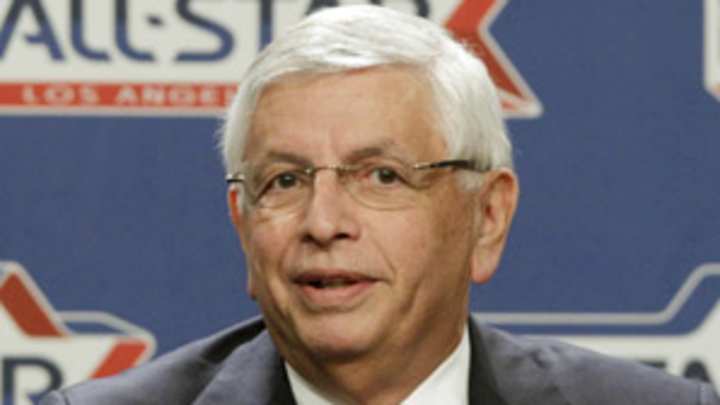Stern absent of optimism when addressing NBA's potential lockout


LOS ANGELES -- The paradox was laid out by commissioner David Stern, who opened his annual state-of-the-NBA news conference Saturday by declaring: "The game is in great shape. It's never been better.'' And then he spent the ensuing hour explaining why his league may not play a single game next season.
"We have expressed our dissatisfaction with each other's proposals,'' said Stern of negotiations with the players' union that appear destined to end in a July lockout. At an informal meeting here Friday, Stern added, the owners and players agreed to arrange multiple meetings "so that by the time the agreement currently in effect expires on June 30, we will hopefully be able to assure our fans that we did all we could possibly do to have a replacement agreement in effect.''
Notice the absence of optimism in that statement. It was neither ambitious nor inspirational for Stern to assume a negative outcome to the talks -- when the league shuts down, let's be able to say we did our best.
TV ratings are up 25 percent, in large part because a few big-spending teams have hoarded talent to create a championship race reminiscent of the 1980s. There lies another paradox: The imbalance of the NBA that helps make the league inordinately popular is, according to Stern, the result of a flawed system that makes it almost impossible for smaller market teams to compete.
"The teams that have been competing the hardest, in terms of moving along in the playoffs, are tax-payers,'' said Stern of the luxury tax that penalizes franchises with the largest payrolls. "We don't think that your ability to pay taxes to have a roster should be a part of the competitive landscape.
"It would be a good thing if more teams could compete. We are very focused, through revenue-sharing and this agreement that we are trying to get, on having small markets with the capacity to compete and succeed in this league.''
Union executive director Billy Hunter has insisted that most of the league's financial difficulties can be resolved by creating a new program to shift revenues from the richest franchises to the poorest. The disparity was underlined by the Lakers' recent agreement on a new local TV deal reportedly worth a staggering $3 billion over 20 years.
Stern replied that revenue-sharing alone won't help more than half of his teams turn red ink into black. That's why he is negotiating to provide less salary to the players at the same time as he is overseeing separate negotiations among the teams that will enable the smaller franchises to share in the success of the Lakers, Knicks and other high-end organizations.
"You can't revenue-share your way to a profit as a league,'' Stern said. "We want a sustainable business model that enables 30 teams to be able to compete for a championship (and) that fairly compensates our union members, who are currently the best-paid union members in the world. And after the agreement that we hope to consummate, they will remain the best-paid union members in the world in a league that is more competitive and hopefully profitable.''
Stern predicted the Pistons will be sold to financier Tom Gores within a week, and he expressed optimism that the Hornets -- currently held in ownership by the league -- may be able to remain in New Orleans after an increase in ticket sales and indications from local government of a better lease arrangement. But he washed his hands of further involvement by the NBA in resolving the lengthy negotiations between the Kings and Sacramento's local government for a new arena. "With the collapse of the last attempt, which took a few years and several million dollars, on behalf of the league I said we are not going to spend any more time on that,'' said Stern. "That is for the Maloofs (who own the Kings) and the people of Sacramento.''
Stern acknowledged that a "franchise tag'' may become a point of negotiation, in order to help teams hold onto their biggest stars. He said a minority of owners have discussed contraction of the league, and he didn't dismiss it as a possibility as part of a larger revenue-sharing proposal.
One bright spot of the Friday meeting was an agreement from both sides to open all topics for discussion, and to not reject contentious issues out of hand. He added that the union indicated it will no longer argue over the veracity of the financial numbers supplied by the league -- instead of arguing over each side's view of those numbers, the players would instead move forward to discuss a new agreement.
"We understand each other. We understand what's at stake here,'' said Stern. "I think this is probably Billy's third [labor negotiation], and it's probably my 13th ... A lockout would have huge negative consequences for everybody, and that's what gives me the hope to and the belief that we are going to knock ourselves out to get it done.''
Stern added that coaches and front-executives can expect to be paid less in years to come, though that will be a decision for each team to make. If there should be a lockout, he indicated he will go unpaid as he did during the 1998-99 stoppage that resulted in a 50-game season. "Last time I didn't take any salary,'' he said when asked by the pledge of NFL commissioner Roger Goodell to work for $1 in the event of a lockout of his league next season. "I think a dollar would be too high in the event of a work stoppage.
"What we have learned, and what the union has learned, is that we both have the capacity to shut down the league,'' said Stern. "There's no magic that's going to keep this league operating if we don't make a deal. That's a very instructive lesson.''
